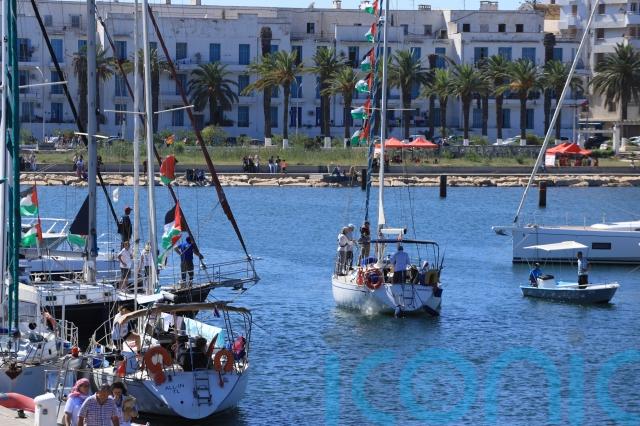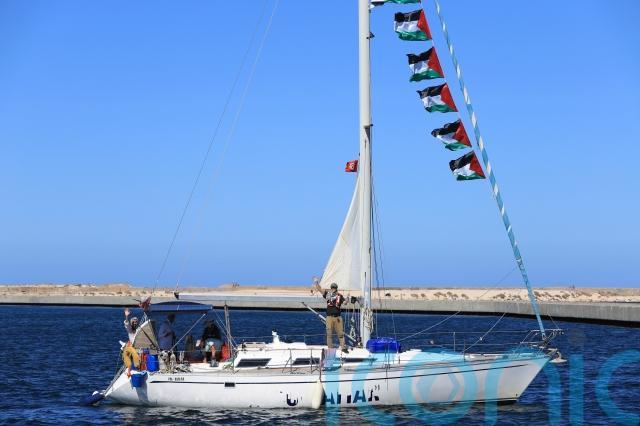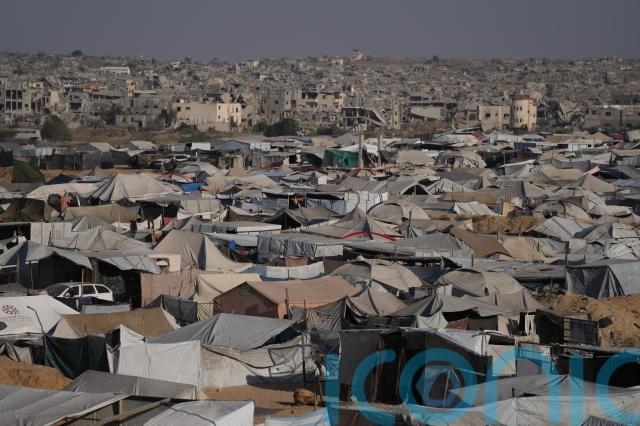
Activists taking part in a flotilla seeking to break the Israeli blockade of Gaza have said that some of their boats were attacked by drones overnight while sailing south of Greece.
The Global Sumud Flotilla said it was attacked during the night by “unidentified drones and communications jamming”.
It said that “at least 13 explosions” were heard on and around several flotilla boats, while drones or aircraft dropped “unidentified objects” on at least 10 boats.
No casualties were reported but there was damage to the vessels and “widespread obstruction in communications”, it added.
Activists posted a brief video on the flotilla’s social media account showing what appeared to be an explosion on or near one of the vessels.
Greece’s coast guard did not report any distress calls.
The Israeli military did not immediately respond to questions regarding the attack.
Italy condemned the attack and activated a navy frigate to be on hand for possible rescue operations, Italian defence minister Guido Crosetto said.
Mr Crosetto said the Italian Navy’s frigate Fasan, which was sailing north of Crete, was “already heading towards the area for possible rescue operations”.
Italy has informed Israel about the decision.
“In a democracy, demonstrations and forms of protest must also be protected when they are carried out in accordance with international law and without resorting to violence,” Mr Crosetto said.

Italy’s Foreign Ministry meanwhile said its computer systems had been overwhelmed by a “mail bombing” campaign in which thousands of what it said were fake emails flooded its servers after the attack on the flotilla.
Earlier on Wednesday, the Global Sumud Flotilla had sent out an urgent appeal to its supporters asking them to email the ministry demanding it take a firm position to condemn the attack on the flotilla, protect the participants and put diplomatic pressure on those responsible.
The emails “had the effect of hindering the work” of the ministry’s crisis unit, which has been the main point of contact for Italian citizens aboard the flotilla, the Foreign Ministry said in a statement.
Foreign minister Antonio Tajani told legislators earlier this month he had personally called Israeli foreign minister Gideon Saar to urge Israel to respect the rights of Italian activists participating in the flotilla.
Mr Tajani said at the time that 58 Italians were participating in the flotilla, including some legislators.
The European Union also warned against any force being used against the flotilla.
“The freedom of navigation under international law must be upheld… So no attacks, no drone strikes, no seizures. Any use of force against the flotilla is not acceptable,” said Eva Hrncirova, a spokesperson for the European Commission.
“We respect the humanitarian commitment of the people who are on board of the flotilla.”
UN Human Rights Office spokesperson Thameen Al-Kheetan called for an “independent, impartial and thorough investigation into the reported attacks and harassment by drones and other objects” against the flotilla.
“Attacks and threats against those trying to deliver aid to and support the hundreds of thousands of people in Gaza who are suffering famine and starvation defy belief,” Mr Al-Kheetan added.
Swedish activist Greta Thunberg, who is on board one of the flotilla boats, called the strikes a “scare tactic” and implored the flotilla’s supporters to stay focused on Gaza rather than on the activists sailing in the Mediterranean Sea.
She said that damage to the fleet was being assessed.
“We were aware of the risks of these kind of attacks and that’s not something that’s going to stop us,” Ms Thunberg said on a livestream on Wednesday morning.
“The most important thing isn’t that we were hit by drones. Drones are something that Palestinians experience 24-7,” she added.
Simone Zambrin, an Italian activist with the flotilla, said that drones “have been flying over our heads for days now” and on Wednesday “dropped devices at our boats, damaging both the sails and the hearing of some of our crew members”.
“We expected it because it is a rhetoric that is part of what Israel is trying to do with regard to missions like ours,” Zambrin said.
“It tries to instil fear because it is afraid of our arrival.”
Greg Stoker, an American activist on board one of the boats, said in a social media post that the vessel’s VHF radio communications also suffered interference, with the jammers playing an Abba song over the VHF channel the flotilla was using.
The flotilla, comprised of dozens of boats from several countries, is carrying a symbolic amount of humanitarian aid, including food and medicine, for Palestinians in Gaza.
The Israeli Foreign Ministry has accused organisers of being linked to Hamas, and says it has proposed that the activists unload their aid in the Israeli port of Ashkelon for it to be transported into Gaza.
“Israel will not allow vessels to enter an active combat zone and will not allow the breach of a lawful naval blockade,” the ministry said on Monday.

“Israel urges the participants not to break the law and to accept Israel’s proposal for a peaceful transfer of any aid they might have.”
The flotilla has reported several attacks since it set sail from Spain on September 1, including two while some of its boats were in Tunisian waters.
The convoy is claimed to be the largest attempt to date to break the Israeli maritime blockade of the Gaza Strip, which has now lasted 18 years, long predating the current war in Gaza.
The almost two-year war has killed more than 65,000 Palestinians, according to the Gaza Health Ministry.
The ministry does not say how many were civilians or combatants, but says more than half have been women and children.
The world’s leading authority on hunger crises said last month that Israel’s blockade and ongoing offensive had already pushed Gaza City into famine.
More than 300,000 people have fled the city in recent weeks as Israel has ordered the population to move south, but an estimated 700,000 remain, according to UN agencies and aid groups.
The war began on October 7 2023, when Hamas-led militants carried out an attack inside Israel that killed 1,200 people, most of them civilians, and saw about 250 people taken hostage.

Israel says its operation in Gaza is aimed at pressuring Hamas to surrender and return the remaining 48 hostages.
Israel believes around 20 of the captives are still alive.
It is not the first time that activists trying to break the Israeli blockade of Gaza have come under attack.
Another vessel said it was attacked by drones in May in international waters off Malta.
An overland convoy travelling across North Africa also attempted to reach the border but was blocked by security forces aligned with Egypt in eastern Libya.
In 2010, Israeli commandos raided the Mavi Marmara, a boat participating in an aid flotilla attempting to breach the blockade of Gaza, killing 10 Turkish activists on board.
Subscribe or register today to discover more from DonegalLive.ie
Buy the e-paper of the Donegal Democrat, Donegal People's Press, Donegal Post and Inish Times here for instant access to Donegal's premier news titles.
Keep up with the latest news from Donegal with our daily newsletter featuring the most important stories of the day delivered to your inbox every evening at 5pm.